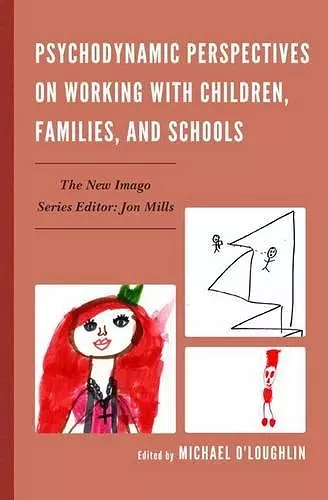Psychodynamic Perspectives on Working with Children, Families, and Schools
Format:Paperback
Publisher:Rowman & Littlefield
Published:15th Jun '14
Currently unavailable, and unfortunately no date known when it will be back
This paperback is available in another edition too:
- Hardback£110.00(9780765709219)

With the push toward accountability and test performance in schools there has been a decline in emphasis on creativity, imagination, and feelings in schools. Psychodynamic Perspectives on Working with Children, Families, and Schools is designed for students and professionals who are interested in restoring such values to their work with children. There is an absence of psychoanalytic ways of thinking in conventional professional discourses of schooling. With a few notable exceptions, the discourses of child development, classroom management, early childhood education, special education, school psychology, and school counseling have constructed notions of children and schooling that are often behaviorist, instrumental, and symptom-focused. Curriculum too often focuses on acquisition of knowledge and behaviors; discipline is conceptualized as compliance, and symptoms such as anger, school resistance, etc., are pathologized and reacted to out of context; children’s special needs are often conceptualized instrumentally; and children with complex psychological symptoms are delimited, depersonalized, or simply removed. Professionals who work with children psychodynamically draw on diverse frameworks including the work of Anna Freud, the long tradition of the Tavistock Clinic in London [e.g., Anne Alvarez, Susan Reid, Margaret Rustin, Frances Tustin, etc.], the writings of Klein, Winnicott, and their colleagues, French analysts [e.g., Piera Aulagnier, Didier Anzieu, Laurent Danon-Boileau, Françoise Dolto, Maud Mannoni, and Catherine Mathelin] and Italian infant/child analyst Alessandro Piontelli. This work is valuable but often inaccessible to school professionals because the writing is somewhat specialized, and because there is no tradition of teaching such work in professional preparation in those fields. This collection is theoretically grounded in that the authors share a commitment to valuing children’s emotions and understand the usefulness of psychoanalytic approaches for enhancing children’s lives. It is laden with examples to invite into this discussion those students and professionals who value these ideas but for whom this book may be their first introduction to progressive educational ideals and psychodynamic ways of working with children. Psychodynamic Perspectives on Working with Children, Families, and Schools provides an introductory volume to open the door to the possibility of introducing psychodynamic frameworks to education and human service professors and school professionals and professionals working with children.
Lombardi includes a truly lovely description of a school program, organized by a philosophy professor, that recognizes small children as the philosophers they can be. ... Many clinicians will find this book enriching. For psychoanalysts, who believe that we have knowledge and skills with wide applications to the most entrenched social problems, this book will be both an inspiration and a guide to creative thinking about education. * Journal of the American Psychoanalytic Association *
Michael O'Loughlin is one of the wisest persons I know. He is brilliant and this book will enlighten many people. It is highly readable and it delivers a number of profound findings. I highly recommend it to lay readers and professionals. Students will find it highly informative and easy to read. -- Conrad P. Pritscher Ph.D, Bowling Green State University
ISBN: 9781442238176
Dimensions: 235mm x 160mm x 30mm
Weight: 653g
348 pages